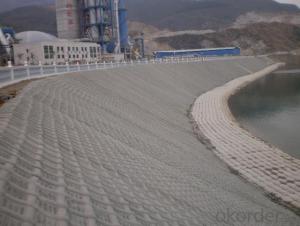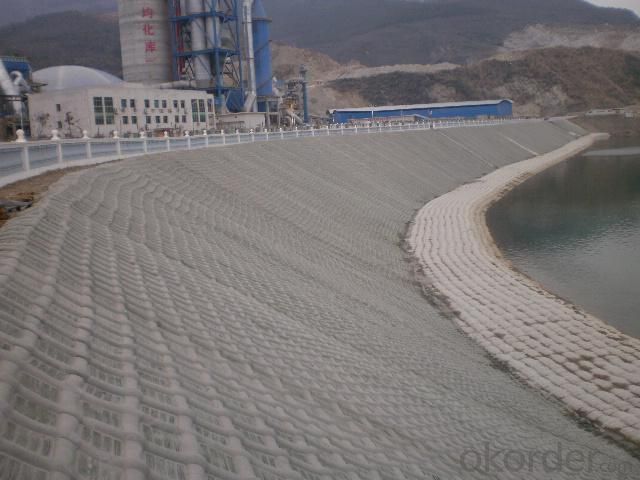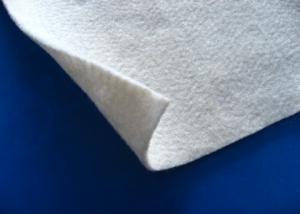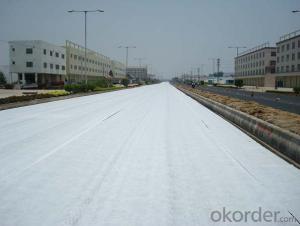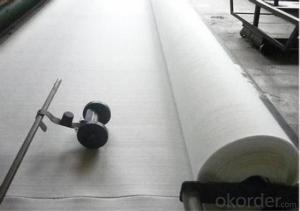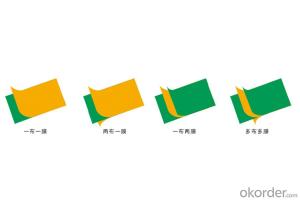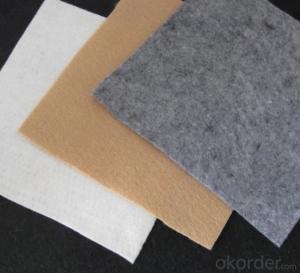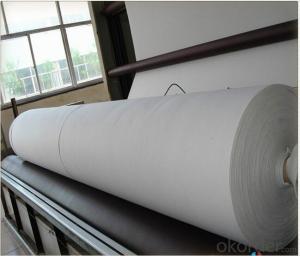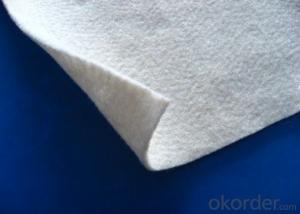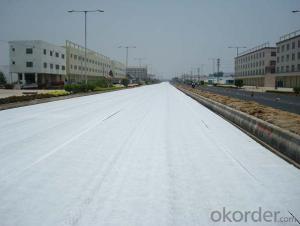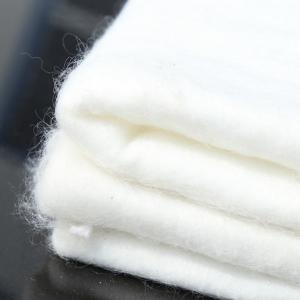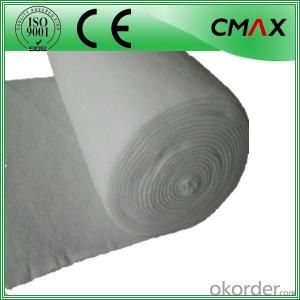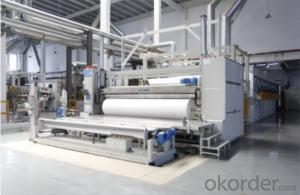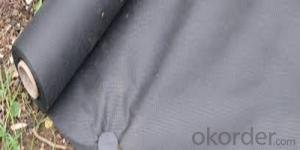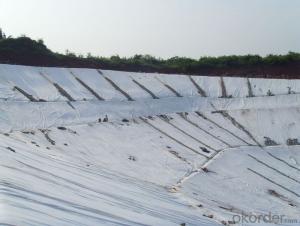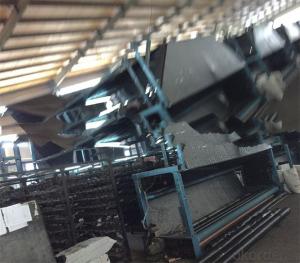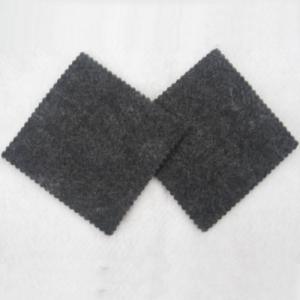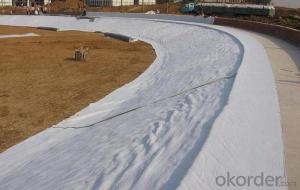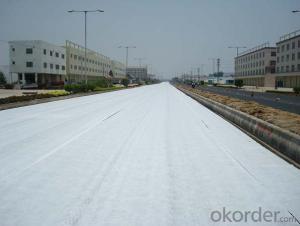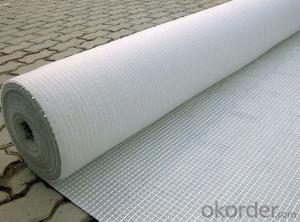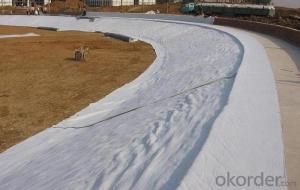Weed Geotextile - Kinds of Geosynthetics in China Geotextile
- Loading Port:
- China Main Port
- Payment Terms:
- TT OR LC
- Min Order Qty:
- -
- Supply Capability:
- -
OKorder Service Pledge
OKorder Financial Service
You Might Also Like
Packaging & Delivery
| Packaging Detail: | 40HQ |
| Delivery Detail: | 7 DAYS |
Specifications
PP/PET short fiber/continuous filament nonwoven geotextile
Colour:White,Green,Grey,Black...
MARKET:AFRICA,JAPAN...
ISO
1). Full name:PET continuous filament spunbond needle punched nonwoven geotextiles.
Factory:We are the manufacturer,geotextile,geomembrane,composite geomembrane,woven geotextile,GCL, triplanar geocomposite,waterproof membrane,PP short fiber, geogrid, geobag,geoweb,geocell, geonet,and so on geosynthetics.
Certificate:ISO9001;ISO14001
Specification: Polyester continuous filament spunbond needle punched nonwoven geotextile
ROLL WIDTH:1 METER,2 METER,3METER,5.8 METER
ROLL LENGTH:50~200METER
GRAM WEIGHT:115,150,200,250,270,340,350,400,420,450,500,550,600,700,800GSM
COLOUR: WHITE,GREEN,GREY,BLACK…
Packing:Black plastic film or white plastic film. paper core inside if you ask.
| PET continuous filament spunbond needle punched nonwoven geotextile(representative average data.) | |||||||||
| Test Item/Unit/No. | HY100 | HY150 | HY200 | HY250 | HY300 | Test Method | |||
| Mechanical Properties | |||||||||
| Tensile Strength | CD | kn/m | 4.8 | 8.3 | 10.9 | 14.5 | 18 | ASTM D 4595 | |
| MD | 7 | 12 | 14 | 18 | 22 | ||||
| Elongation at maximum load | CD | % | 65 | 64 | 63 | 62 | 61 | ||
| MD | 64 | 63 | 62 | 61 | 60 | ||||
| Grab Strength | CD | kn ≥ | 0.36 | 0.58 | 0.87 | 1.08 | 1.35 | ASTM D 4632 | |
| MD | 0.42 | 0.78 | 1.07 | 1.33 | 1.6 | ||||
| Grab Elongation | CD | % | 55 | 55 | 59 | 59 | 60 | ||
| MD | 50 | 50 | 51 | 51 | 53 | ||||
| Trapezoidal Tear | CD | kn ≥ | 0.16 | 0.23 | 0.31 | 0.39 | 0.46 | ASTM D 4533 | |
| MD | 0.245 | 0.31 | 0.42 | 0.46 | 0.55 | ||||
| Burst Strength-CBR plunger method | kn ≥ | 0.85 | 1.47 | 2.3 | 2.8 | 3.3 | ASTM D 6241 | ||
| Puncture resistance | n ≥ | 220 | 320 | 430 | 540 | 650 | ASTM D 4833 | ||
| Mullen Burst | Mpa | 1.2 | 1.8 | 2.3 | 2.8 | 3.3 | ASTM D 3786 | ||
| Cone drop resistance(hole-Φ)Dynamic perforation diameter | mm | 34 | 30 | 26 | 22 | 19 | BS EN 918-1996 | ||
| Hydraulic Properties | |||||||||
| Flow Rate,Q100 | L/s/m² | 200 | 210 | 180 | 150 | 140 | ASTM D 4491 | ||
| Permeability | cm/s | 0.48 | 0.43 | 0.39 | 0.36 | 0.34 | |||
| Apparent Opening Size O95 | mm ≤ | 0.13 | 0.12 | 0.12 | 0.11 | 0.11 | ASTM D 4751 | ||
| Apparent Opening Size O90 | mm ≤ | 0.12 | 0.11 | 0.11 | 0.1 | 0.1 | |||
| Physical Identification Properties | |||||||||
| Thickness 2KPa | mm | 1.1 | 1.3 | 1.8 | 2.5 | 2.9 | ASTM D 5199 | ||
| Mass per unit area | g/m² | 100 | 150 | 200 | 250 | 300 | ASTM D 5261 | ||
| Width | m | 2/3/6/ | 2/3/6/ | 2/3/6/ | 2/3/6/ | 2/3/6/ | |||
- Q: The difference between short wire geotextile and filament geotextile
- Geotextile is a collectively, he includes filament geotextile, short wire geotextile, woven geotextile, woven geotextile, hot pressed nonwovens. Polyester filament geotextile color is mainly white, green. Gray two categories. The length of the fiber is greater than 4.5 cm. Strong strength is very high. Looks very good distinction.
- Q: Are geotextiles suitable for use in drainage ditches?
- Yes, geotextiles are suitable for use in drainage ditches. They are commonly used as a filter fabric to prevent soil erosion and retain sediment, while allowing the passage of water. Geotextiles also help in distributing the flow of water evenly throughout the drainage ditch, improving its efficiency and preventing clogging.
- Q: Now geotextile price quota how?
- 2017 geotextile price cheaper than last year, the current price of raw materials is relatively stable production. Geotextile classification of many, you ask more general, so no way to give you a detailed offer. Different technical requirements are uneven prices, but the overall price has come down, and is now the lowest price since 2017.
- Q: What are the materials used for spinning geotextiles?
- Geotextile is divided into several, filament spunbond acupuncture non-woven geotextile, this is the name suggests is to use silk to do; staple acupuncture non-woven geotextile, this is the use of fiber to do;
- Q: How do geotextiles help with soil reinforcement in geogrid applications?
- Geotextiles help with soil reinforcement in geogrid applications by acting as a separator and providing confinement to the soil particles. They prevent the intermixing of fine and coarse particles, improving the stability and load-bearing capacity of the soil. Additionally, geotextiles distribute the load over a larger area, reducing localized stresses and preventing soil erosion.
- Q: How do geotextiles help in preventing soil liquefaction?
- Geotextiles help in preventing soil liquefaction by providing stability and reinforcement to the soil. They act as a barrier and restrict the movement of soil particles, thereby reducing the potential for liquefaction. Additionally, geotextiles enhance the drainage capacity of the soil, allowing water to flow through and preventing the buildup of excess pore pressure, which is a major factor leading to liquefaction.
- Q: What are the different methods of installing geotextiles?
- There are several methods of installing geotextiles, including direct placement, trench installation, and anchoring. Direct placement involves simply unrolling the geotextile fabric over the desired area and securing it with stakes or other means. Trench installation involves excavating a trench, placing the geotextile fabric in the trench, and backfilling it with soil or other materials. Anchoring is another method where the geotextile fabric is secured to the ground using anchors, such as pins or staples, to prevent movement or displacement.
- Q: Can geotextiles be used in geogrid reinforced slopes?
- Yes, geotextiles can be used in geogrid reinforced slopes. Geotextiles are often used as a separation and filtration layer between the soil and the geogrid, which helps to enhance the performance and stability of the reinforced slope.
- Q: What is the price of composite geotextile?
- Geotextile is divided into polyester short geotextile, staple acupuncture geotextile, polyester filament geotextile, woven geotextile, filament woven geotextile, and so on. Specifications and different models, the price is also different, composite geotextile weight in the 80-1500g / ㎡ between the quality standards are divided into non-standard, whitening A, Sinochem, the general national standard and so on. The t value is generally between 4900 and 7500 yuan / ton, 187 & lt; 6600 & lt; 5604
- Q: What are the environmental impacts of using geotextiles?
- Geotextiles can have both positive and negative environmental impacts. On the positive side, they can help prevent soil erosion, improve water quality by filtering pollutants, and promote vegetation growth. Additionally, they can reduce the need for chemical treatments and provide a sustainable alternative to traditional construction materials. However, geotextiles are typically made from synthetic materials like polyester or polypropylene, which are derived from non-renewable resources and can release microplastics into the environment. Moreover, the production and disposal of geotextiles can contribute to greenhouse gas emissions and waste generation. Therefore, careful consideration of the environmental trade-offs is necessary when using geotextiles.
Send your message to us
Weed Geotextile - Kinds of Geosynthetics in China Geotextile
- Loading Port:
- China Main Port
- Payment Terms:
- TT OR LC
- Min Order Qty:
- -
- Supply Capability:
- -
OKorder Service Pledge
OKorder Financial Service
Similar products
Hot products
Hot Searches
Related keywords
